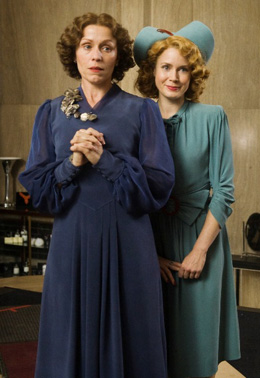I wasn’t going to see this movie but after reading this review from Toronto Life…
Miss Pettigrew Lives for a Day (****)
“There’s something not quite right about Frances McDormand’s Miss Pettigrew. A frowzy clergyman’s daughter who works as a London governess—an unsuccessful venture for her, as she can’t help proselytizing to her employers—she begins the film penniless, and soon falls into the service of Delysia Lafosse (the irrepressible Amy Adams), whose glamour seems bound to change her forever.
Yet ultimately it’s Pettigrew who effects the most change. She is a wise woman, it turns out, and has known both love and tragedy. The shift is unconvincing (how could Pettigrew be so naively shocked at Delysia’s promiscuity and slovenliness when she has spent her whole, hardscrabble life chastising people for such things?) but completely excusable, for Miss Pettigrew Lives for a Day is unabashed fiction. Based on an obscure 1930s novel by Winifred Watson, it is an ode to that decade’s frothiest, most urbane films—particularly those of George Cukor and Ernst Lubitsch. Pettigrew, herself an avid moviegoer, clearly knows the drill; like a reluctant Prospero, she instructs Delysia (who, as embodied by Adams, recalls Carole Lombard, Jeanette MacDonald and Jean Harlow, among others) in just how to bring the story to a satisfying conclusion.
The meta-narrative is surprisingly sophisticated and effective (much like the film’s heroine), but makes Miss Pettigrew a bit of a curio. Who is it for? The make-over porn promised in the trailer is slight, and the film’s confectionary art direction seems, above all, conceptual. Indeed, Miss Pettigrew is about the value and fragility of aesthetics (a motif of air-raid sirens reminds us that bliss is a fleeting thing)—not, say, the triumph of vigorous, youthful idealism. It is escapism for adults, and as such seems oddly, admirably out of vogue.”

